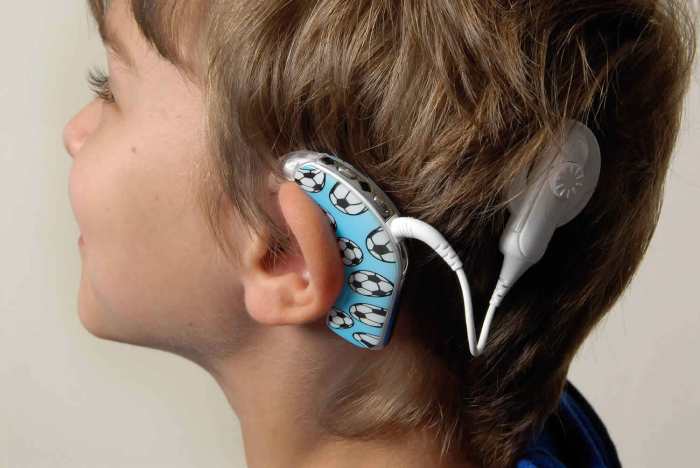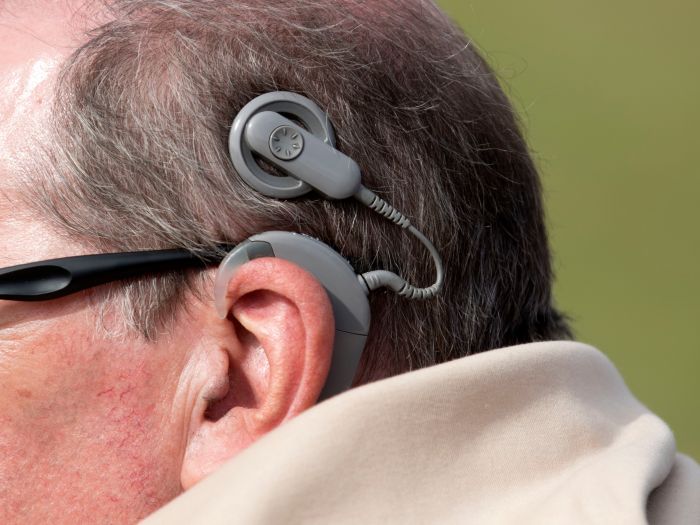As we delve into the topic of cochlear implants, a question arises that challenges our understanding: which of the following statements about cochlear implants is false? This inquiry sets the stage for an exploration that unravels the intricacies of this remarkable technology, its benefits, limitations, and ethical implications.
Cochlear implants, a marvel of modern medicine, have transformed the lives of individuals with severe hearing loss. These devices, surgically implanted into the inner ear, bypass damaged sensory cells and directly stimulate the auditory nerve, restoring a sense of hearing to those who have lost it.
1. Cochlear Implant Components and Functionality

Cochlear implants are complex electronic devices that aim to restore hearing in individuals with severe to profound hearing loss. They consist of two main components: an external sound processor and an internal implant.
The external sound processor sits behind the ear and contains a microphone, a speech processor, and a transmitter. The microphone picks up sound waves and converts them into electrical signals. The speech processor analyzes the signals and converts them into a digital code.
The transmitter then sends the digital code to the internal implant.
The internal implant is surgically placed inside the cochlea, the spiral-shaped organ in the inner ear responsible for hearing. The implant consists of an electrode array, a receiver, and a stimulator. The electrode array is inserted into the cochlea and contains electrodes that stimulate the auditory nerve.
The receiver receives the digital code from the transmitter and sends it to the stimulator. The stimulator converts the digital code into electrical impulses that stimulate the auditory nerve, allowing the individual to hear.
2. Surgical Procedure and Recovery
Cochlear implant surgery is typically performed on an outpatient basis. The procedure involves making an incision behind the ear and creating a small opening in the skull to access the cochlea. The electrode array is then inserted into the cochlea, and the internal implant is secured in place.
The recovery period after cochlear implant surgery is typically short. Most individuals are able to go home the same day or the next day after surgery. There may be some discomfort or swelling around the incision site, which can be managed with pain medication.
It is important to keep the incision site clean and dry during the healing process.
After surgery, individuals will need to undergo rehabilitation to learn how to use their cochlear implant. Rehabilitation typically involves working with a speech therapist to develop listening and speaking skills. It may also involve learning how to use the external sound processor and how to adjust the settings to optimize hearing.
3. Benefits and Limitations of Cochlear Implants

Cochlear implants can provide significant benefits for individuals with severe to profound hearing loss. They can help individuals to hear sounds, understand speech, and participate in conversations. Cochlear implants can also improve quality of life by allowing individuals to communicate more effectively and to enjoy activities that they may have previously missed out on.
However, there are also some limitations to cochlear implants. They do not restore hearing to normal levels, and they may not be effective for everyone. Additionally, cochlear implants can be expensive, and they require ongoing maintenance and care.
Overall, cochlear implants are a valuable tool for individuals with severe to profound hearing loss. They can provide significant benefits and improve quality of life. However, it is important to be aware of the limitations of cochlear implants before making a decision about whether or not to get one.
4. Ethical Considerations and Societal Impact

Cochlear implants raise a number of ethical considerations. One concern is access and equity. Cochlear implants are expensive, and they may not be available to everyone who needs them. This can create a divide between those who have access to cochlear implants and those who do not.
Another concern is the potential impact of cochlear implants on deaf culture and identity. Some members of the deaf community view cochlear implants as a threat to their culture and identity. They argue that cochlear implants can lead to the assimilation of deaf people into hearing society and the loss of deaf culture.
It is important to weigh the potential benefits of cochlear implants against the ethical concerns. Cochlear implants can provide significant benefits for individuals with severe to profound hearing loss. However, it is important to ensure that cochlear implants are available to everyone who needs them and that the rights of the deaf community are respected.
5. Future Directions and Research
There are a number of emerging technologies and advancements in cochlear implant design. One area of research is focused on developing cochlear implants that are smaller and less invasive. Another area of research is focused on developing cochlear implants that can restore hearing to a wider range of frequencies.
There is also ongoing research on the use of cochlear implants for other purposes, such as tinnitus treatment and balance disorders. Cochlear implants have the potential to provide significant benefits for a wide range of individuals, and research is ongoing to improve their effectiveness and expand their applications.
FAQ Insights: Which Of The Following Statements About Cochlear Implants Is False
Can cochlear implants fully restore normal hearing?
While cochlear implants significantly improve hearing, they do not fully restore normal hearing. They provide a perception of sound, but the quality and clarity may differ from natural hearing.
Are cochlear implants suitable for everyone with hearing loss?
No, cochlear implants are primarily recommended for individuals with severe to profound sensorineural hearing loss who have limited benefit from conventional hearing aids.
Do cochlear implants have any long-term risks or complications?
Cochlear implants are generally safe, but potential risks include infection, device failure, and tinnitus. Regular monitoring and maintenance are essential to minimize these risks.